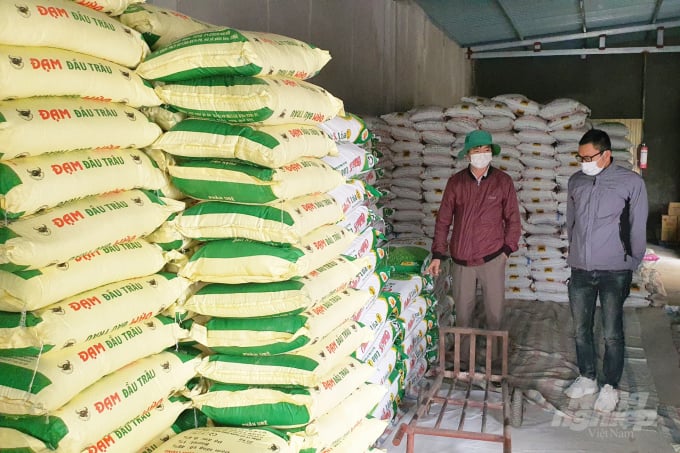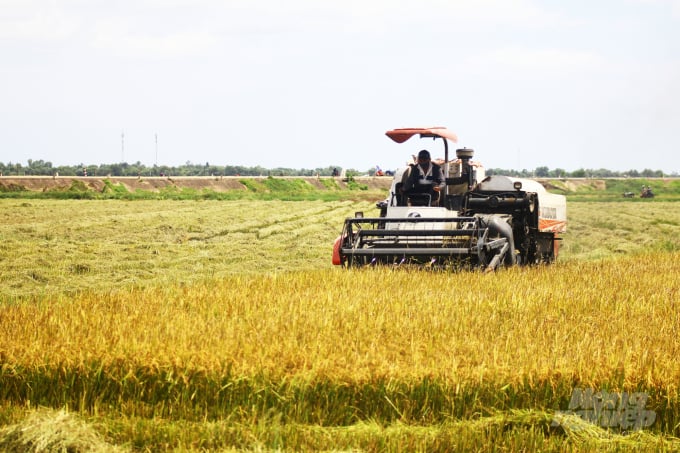June 14, 2025 | 19:13 GMT +7
June 14, 2025 | 19:13 GMT +7
Hotline: 0913.378.918
June 14, 2025 | 19:13 GMT +7
Hotline: 0913.378.918
In the winter-spring crop 2021 - 2022, Xuan Vien Cooperative, Hai Duong commune, Hai Lang district (Quang Tri) planted 130 ha of rice. From the beginning of the crop, people had to pay VND 19,000-20,000 for a kilo of NPK and nitrogen fertilizers, double that of the previous crop. The high prices of fertilizers and agricultural inputs caused difficulties for them.
It is estimated that, on average, for each acre of cultivation, people use 25 kg of NPK fertilizer to fertilise. Moreover, depending on the growth process of the rice plant, farmers could fertiliser more. The good news is that after a month of planting, thanks to favorable weather, the rice plants grew well, so many households did not apply fertiliser for the second time.

The price of inorganic fertilizers and agricultural materials has increased, causing many difficulties for farmers. Photo: CD.
Nguyen Ngoc Sinh, Director of Xuan Vien Cooperative said that, local framers still kept the habit of using inorganic fertilizers for rice.
When the price of fertilizer increased, they thought about reducing the amount of fertilizer. However, if fertilizer was reduced, the yield would be lower, Sinh said.
“In the winter-spring crop 2021 - 2022, the cooperative surveyed and purchased 15 tons of fertiliser from Tien Nong Agricultural Industry Joint Stock Company. The fertiliser is cheaper, initially showing adaptation to the field. However, we will test one or two crops to see how the results are, and then recommend people to use instead high-priced fertilisers like today," said Sinh.
Sinh also shared that the cooperative regularly called on people to use more organic fertilisers, but changing the habit of using chemical fertilizers in production was not easy.
“Many people still think that using organic fertilisers will make rice plants susceptible to pests and diseases, affecting productivity or using inorganic fertilizers will have good plants and high yields,” he said.
Currently, the fertilisers that farmers are using are mostly inorganic fertilisers such as URE, DAP, SA, KALI, NPK.
The agricultural industry is moving towards the production of organic and high-quality agricultural products. However, one of the challenges is that farmers still overuse inorganic fertilisers.
The communication calling farmers for using organic fertilisers is still limited. Therefore, the functional sector needs to orient and change the production mindset for people so that they understand the practical benefits of using organic fertilisers.
Organic fertiliser could make the soil more and more fertile due to the development of microorganisms, which has a good effect on product quality. The agricultural products produced have high economic value, meeting the export standards of the world agricultural product consumption market. At the same time, using organic fertiliser also helps reduce environmental pollution, protect the health of producers and consumers, and improve production efficiency.

Farmers in Quang Tri are facing many difficulties in the context of high fertilizer prices. Photo: CD.
Recently, Quang Tri Trading Joint Stock Company has purchased chicken manure from farms and launched Sepon mineral organic fertiliser brand. Initially, this organic fertiliser received positive feedback from users. However, at present, the number of enterprises producing organic fertilizers as above is too small.
To encourage enterprises to participate in the production and supply of organic fertilisers, it is necessary to have a preferential mechanism to attract investment in this field for both production and trading enterprises. In addition, it is necessary to prioritise capital sources to build, pilot, and replicate models of production and use of fertilisers economically and effectively.
For example, the application model of microbial products to treat rice straw to make organic fertiliser for rice production; smart rice farming model adapting to climate change associated with technical progress "1 must 5 reductions"; the process of microbial composting from coffee pods.
Due to the high prices of inorganic fertilisers, the agricultural sector needs to organise communication campaigns and guide people to use fertilisers rationally, properly and effectively.
The province also guides localities to accelerate the application of technical advances, pest management models, integrated crops (IPM, ICM), natural farming, lower-cost production in agricultural production.
Currently, 40 per cent of fertilisers used in countries like Japan, the US, Australia are organic fertilisers. Meanwhile, in Vietnam, the use of organic fertilizers is still very small. The overwhelming use of inorganic fertilizers in agricultural production leads to high production costs, high risk of chemical residues in products, difficulty in exporting, and reduced profits.
Translated by Hien Anh

(VAN) In Tien Giang, a high-tech shrimp farm has developed a distinctive energy-saving farming model that has yielded promising results.
![Turning wind and rain into action: [3] 300.000 farmers benefit from agro-climatic bulletins](https://t.ex-cdn.com/nongnghiepmoitruong.vn/608w/files/news/2025/06/12/e5a48259d6a262fc3bb3-nongnghiep-125122.jpg)
(VAN) The agro-climatic bulletin has become a valuable tool for farmers in the Mekong Delta. After more than five years of implementation, the initiative is gradually being expanded nationwide.
![Turning wind and rain into action: [2] Providing forecasts to the people](https://t.ex-cdn.com/nongnghiepmoitruong.vn/608w/files/news/2025/06/12/e5a48259d6a262fc3bb3-nongnghiep-103927.jpg)
(VAN) In addition to improving the quality of hydrometeorological forecasts, putting forecast bulletins into practical use is crucial for production and disaster prevention.

(VAN) Blue carbon is receiving attention for its rapid absorption capacity and vast potential. It represents a promising nature-based solution to respond to climate change.
/2025/06/11/3507-1-161904_583.jpg)
(VAN) Seagrass beds and coral reefs serve as 'cradles' that nurture life in the ocean depths, creating rich aquatic resources in Vietnamese waters.
![Turning wind and rain into action: [1] Forecasting for farmers](https://t.ex-cdn.com/nongnghiepmoitruong.vn/608w/files/news/2025/06/11/e5a48259d6a262fc3bb3-nongnghiep-111919.jpg)
(VAN) Weather is no longer just a matter of fate. Forecasts have now become an essential companion for farmers in every crop season.
/2025/06/10/2501-3-082025_983.jpg)
(VAN) Mr. Le Hoang Minh, Head of Vinamilk's Net Zero project, recently shared insights on the integration of production, energy, and technology in Vinamilk’s green transition journey.